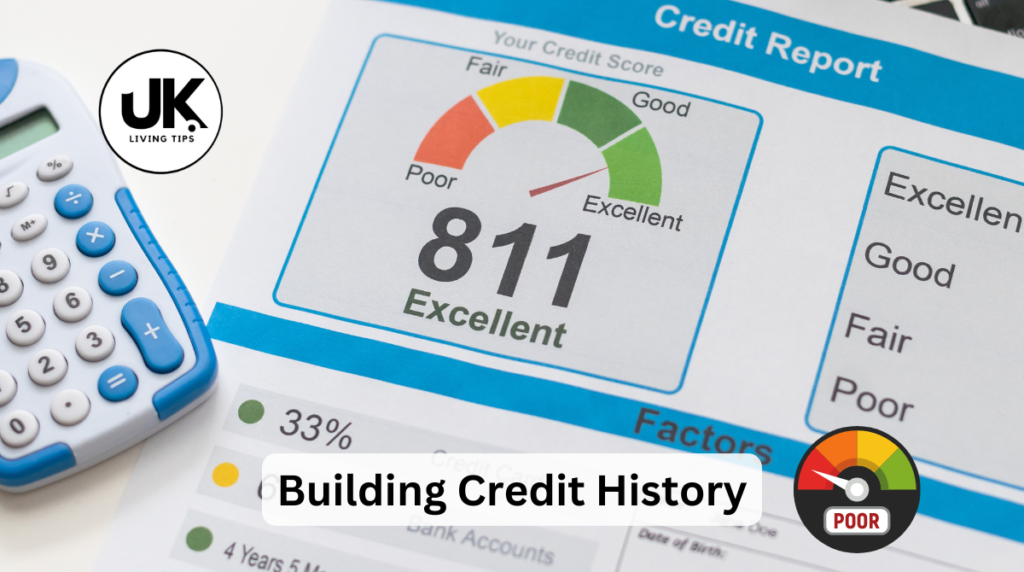Building Credit History
Building a strong credit history is important for achieving financial freedom. A good credit score opens doors to lower interest rates on loans (for cars, houses, or even student loans), better insurance rates, and even apartment rentals. But what exactly is a credit history, and how do you build one? It might sound complicated, but with a little understanding and consistent effort, anyone can establish a positive credit profile.
READ ALSO: Stamp Duty in the UK: What You Need to Know
Overview
Understanding Your Credit History:
Your credit history is a record of your borrowing and repayment behavior. Lenders use this information to assess your creditworthiness – essentially, how likely you are to repay borrowed money. This history is summarized in your credit report, which contains information about your accounts (credit cards, loans, etc.), payment history, and any public records like bankruptcies or judgments. Your credit score, a numerical representation of your creditworthiness, is derived from the information in your report.
Step 1: Get Your Free Credit Report:
Before you start building, you need to know your starting point. You’re entitled to a free credit report from each of the three major credit bureaus (Equifax, Experian, and TransUnion) annually at AnnualCreditReport.com. Don’t confuse this with free credit score sites – these reports are the actual detailed records. Review your reports carefully for accuracy. If you find any errors, dispute them immediately.
The three main credit reference agencies in the UK are:
- Experian:
- Website: www.experian.co.uk
- Contact Details: Their website provides various contact options depending on your needs (e.g., customer service, dispute a credit report). Look for a “Contact Us” or similar section on their site.
- Equifax:
- Website: www.equifax.co.uk
- Contact Details: Similar to Experian, Equifax provides multiple contact methods on their website. Check their “Contact Us” page.
- TransUnion (formerly Callcredit):
- Website: www.transunion.co.uk
- Contact Details: Their website will have their contact information, likely accessible through a “Contact Us” or similar link.
Important Note: Contact details can change, so it’s always best to find the most up-to-date information directly on each credit bureau’s official website. Avoid relying on third-party websites for contact information as these may be outdated or inaccurate.
Step 2: Start Small – Secured Credit Cards:
Secured credit cards are an excellent entry point for building credit. These cards require a security deposit, which acts as your credit limit. This reduces the lender’s risk, making approval easier, even with limited or no credit history. Use your secured card responsibly by keeping your spending low (ideally under 30% of your credit limit) and paying your balance in full and on time every month.
Step 3: Responsible Credit Card Use:
Once you’ve established a history with a secured card, you might be ready for an unsecured card. This card doesn’t require a security deposit. Continue practicing responsible credit card use:
- Keep your credit utilization low: Aim for under 30% of your available credit. High utilization signals higher risk to lenders.
- Pay on time, every time: Late payments severely damage your credit score. Set up automatic payments to avoid missing deadlines.
- Keep your accounts open: Closing old accounts can shorten your credit history length, negatively affecting your score.
- Monitor your credit report regularly: Keep an eye out for errors or fraudulent activity.
Step 4: Explore Other Credit-Building Options:
Beyond credit cards, there are other avenues to build credit:
- Become an authorized user: If a trusted friend or family member has good credit, ask if they’d add you as an authorized user on their credit card. Their positive payment history can be reported on your credit report. (Be sure to have a strong relationship and agreement on usage before doing this.)
- Credit-builder loans: These small loans are specifically designed to help build credit. You make regular payments, and the lender reports your payment activity to the credit bureaus.
- Installment loans: Loans with fixed monthly payments, like personal loans or auto loans, can help build credit if you make all payments on time.
Step 5: Avoid These Credit Mistakes:
- Applying for too much credit at once: Multiple credit applications in a short period can lower your credit score.
- Ignoring your debt: Ignoring debt or letting accounts go into collections will severely harm your credit.
- Maxing out your credit cards: High credit utilization is a significant negative factor in credit scoring.
- Closing old accounts prematurely: Keeping old accounts open (and in good standing) increases the length of your credit history, which is beneficial.
Step 6: Understanding Your Credit Score:
Your credit score is a crucial indicator of your creditworthiness. Scores range typically from 300 to 850, with higher scores indicating better credit. While the exact scoring model varies by bureau, they generally consider these factors:
- Payment history (35%): The most significant factor. On-time payments are crucial.
- Amounts owed (30%): Your credit utilization is key here.
- Length of credit history (15%): Longer history generally results in higher scores.
- Credit mix (10%): Having a variety of credit accounts (credit cards, loans) can help.
- New credit (10%): Applying for too much new credit at once can hurt your score.
Staying on Track:
Building credit takes time and patience. It’s a marathon, not a sprint. Consistent responsible behavior is key. Regularly check your credit reports and scores to monitor your progress and address any potential issues promptly. Remember, establishing a positive credit history is a cornerstone of financial well-being, allowing you to access better financial opportunities in the future.
FAQ:
Q: How long does it take to build good credit?
A: Building a good credit history typically takes several months to a few years of consistently responsible credit behaviour.
Q: What is a good credit score?
A: Generally, a score above 700 is considered good, while a score above 800 is excellent.
Q: What if I have errors on my credit report?
A: Contact the credit bureau immediately to dispute the errors. Provide documentation to support your claim.
Q: Can I build credit without a credit card?
A: Yes, you can use credit-builder loans or become an authorized user on someone else’s account.
Q: How often should I check my credit report?
A: Check your reports at least once a year, ideally more often if you’re actively building credit.
Q: What happens if I miss a payment?
A: Missing payments will negatively impact your credit score, potentially leading to higher interest rates on future loans.
Q: Can I improve my credit score quickly?
A: While you can’t dramatically improve your score overnight, consistent responsible credit behavior over time will yield positive results.
Q: Where can I get a free credit score?
A: Many banks and credit card companies offer free credit scores to their customers. Some free credit score websites are available, but be aware of potential limitations or advertising. Remember, the free credit report from AnnualCreditReport.com is your most valuable resource.



